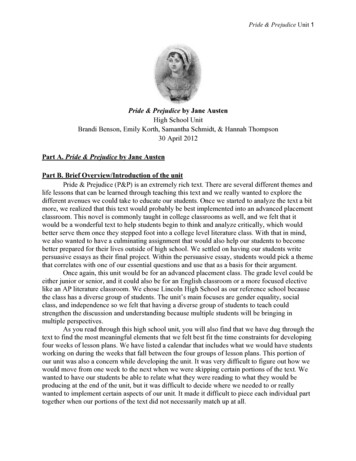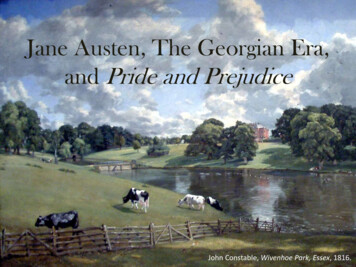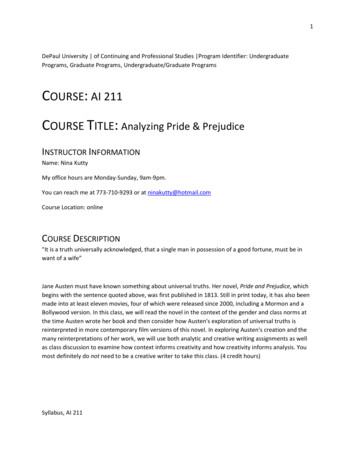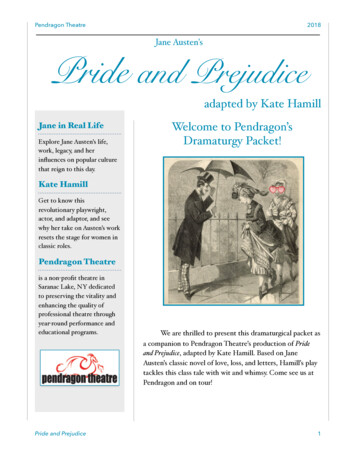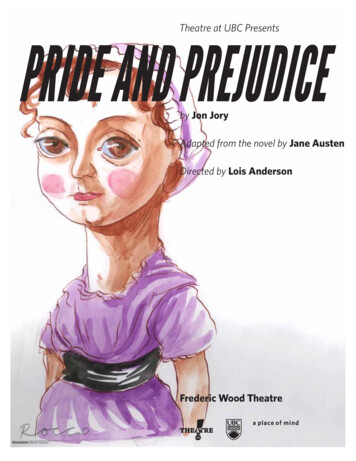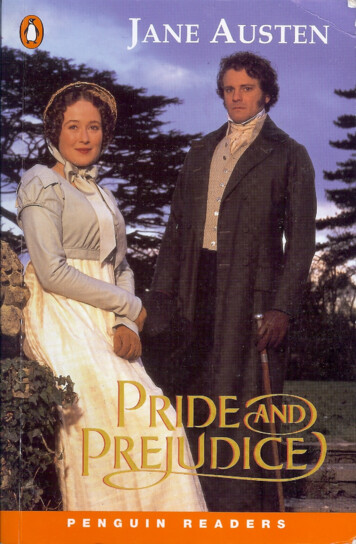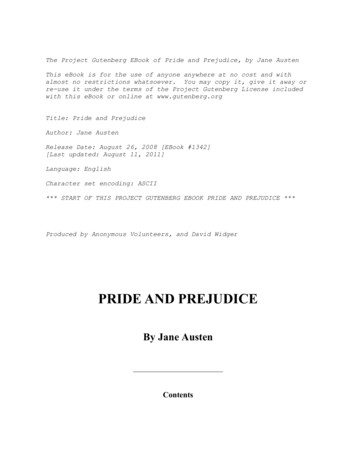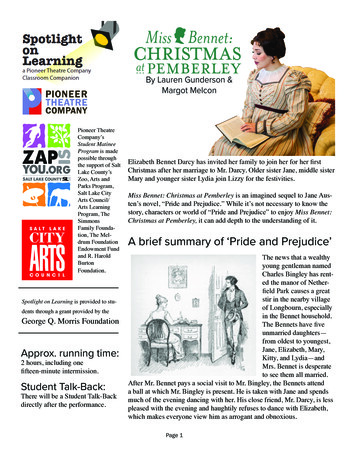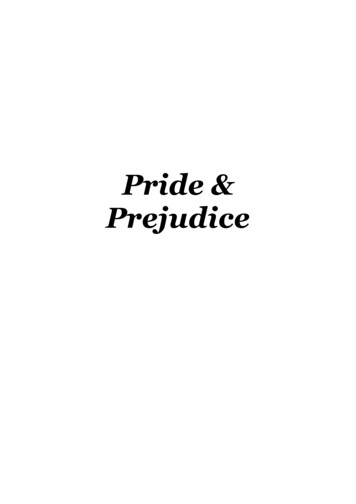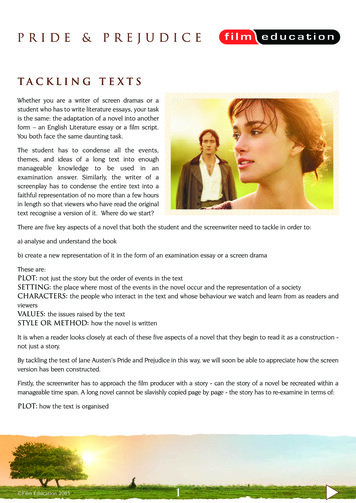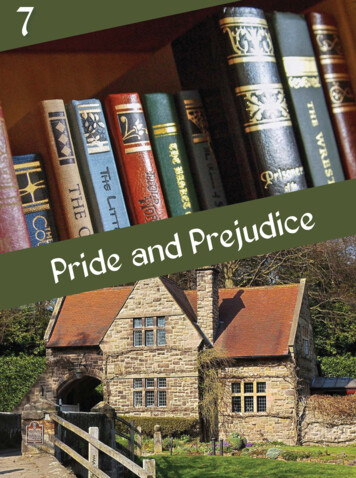
Transcription
7ecidujerPdnaePrid77
7Pride and PrejudicePride and Prejudice is a romanticnovel by Jane Austen,focusing on the concept of loveduring the late 18th century inEngland. In fact, Austen originallytitled her novel First Impressions.The novel revolves aroundthe importance of marryingfor love, not simply for money,despite the social pressuresto make a good (i.e. wealthy) match.The comedy of the writing liesin the depiction of manners,education, marriage and moneyduring the British Regencyperiod.http://en.wikipedia.org/wiki/Pride and Prejudice78
1. Work in groups and discuss the following questions:a. Is reputation and people's social status critical for you toappreciate them as individuals?b. To what extent are you influenced by first impressions?Explain giving examples.c. Which characteristics make a person ‘significant’, in your opinion?groupwork2. Read the plot summary of the novelpair workand work in pairs to do the tasks below.Mr Bennet is an English gentleman who livesin Hertfordshire with his overbearing wife andtheir five daughters; beautiful Jane, cleverElizabeth, bookish Mary, immature Kitty andwild Lydia. The family’s future happiness andsecurity depend on the girls’ marriages sincetheir house, after Mr Bennet’s death, will beinherited by a distant cousin they have nevermet before. They all lead an ordinary lifeuntil the arrival of a rich gentleman in theirneighbourhood. Mr Bingley, who rents a largehouse in order to spend the summer in thecountryside, brings along his sister and hisattractive, wealthy and proud friend, Mr Darcy.Love is soon in the air for one of the Bennetsisters. Yet many trials and tribulations standbetween the Bennet sisters and their happinessdue to social status and class differences, gossipand scandals.Pride and Prejudice is a story of romancebetween the spirited and lovely but povertystricken and prejudiced Elizabeth, and thepompous, proud and intriguing aristocratMr Darcy. The story charts the emotionaldevelopment of the protagonist, ElizabethBennet, who learns from her mistakes, regretshaving made hasty judgments and comes toappreciate the difference between superficialand essential.a. Who are the main characters? Fill in the graphicorganiser with basic information about the story.b. Which of the Bennet daughters seems to play asignificant role in the book?c. Who seems to be important to Elizabeth from thebeginning of the novel?d. Why do the Bennet sisters have to marry wealthymen?e. Why does Mr Bingley’s arrival seem to be important?79
7Pride and Prejudice3. Read the adapted summary of the first chapters of Jane Austen's novelPride and Prejudice and work in groups to do the tasks below.A. The news that a wealthy young gentlemannamed Charles Bingley has rented the manorknown as Netherfield Park causes a great stirin the neighbouring village of Longbourn,especially in the Bennet household. TheBennets have five unmarried daughters, andMrs Bennet, a foolish and fussy gossip, is thesort who agrees with the novel’s openingwords: “It is a truth universally acknowledgedthat a single man in possession of a goodfortune must be in want of a wife.” She seesBingley’s arrival as an opportunity for one ofthe girls to obtain a wealthy spouse, and shetherefore insists that her husband call on thenew arrival immediately. The Bennets invitehim to dinner shortly afterwards, but he iscalled away to London. Soon, however, hereturns to Netherfield Park with his two sisters,his brother-in-law, and a friend named Darcy.B. Mr Bingley and his guests go to a ball in thenearby town of Meryton. The Bennet sistersattend the ball with their mother. The eldestdaughter, Jane, dances twice with Bingley.Within Elizabeth’s hearing, Bingley exclaims toDarcy that Jane is “the most beautiful creature”he has ever beheld. Bingley suggests thatDarcy dance with Elizabeth, but Darcy refuses,saying, “she is tolerable, but not handsomeenough to tempt me.” He proceeds to declarethat he has no interest in women who are“slighted by other men.” Elizabeth takes animmediate and understandable dislike to Darcy.Because of Darcy’s comments and refusal todance with anyone not rich and well bred, theneighbourhood takes a similar dislike; on the80other hand, they declare Bingley to be quite“amiable.”C. Bingley has inherited a hundred thousandpounds from his father, but for now, in spiteof his sisters’ complaints, he lives as a tenant.His friendship with Darcy is “steady,” despitethe contrast in their characters, illustrated intheir respective reactions to the Meryton ball.Bingley, cheerful and sociable, has an excellenttime and is taken with Jane; Darcy, cleverer butless tactful, finds people dull and even criticizesJane for smiling too often.D. Bingley’s sisters exchange visits with theBennets and attempt to befriend Elizabeth andJane. Meanwhile, Bingley continues to payattention to Jane, and Elizabeth decides thather sister is very much in love with him butconceals it very well. Elizabeth says it is betterfor a young woman to be patient until she issure of her feelings.E. Darcy finds himself attracted to Elizabeth.He begins listening to her conversations atparties, much to her surprise. At one party at theLucas house, Sir William attempts to persuadeElizabeth and Darcy to dance together, butElizabeth refuses. Shortly afterwards, Darcy tellsBingley’s unmarried sister that “Miss ElizabethBennet” is now the object of his admiration.F. Miss Bingley spends the following nightin a similar fashion, trying to attract Darcy’sattention: first by reading, then by criticizing thefoolishness of balls, and finally by walking aboutthe room. Only when she asks Elizabeth to walkwith her, however, does Darcy look up, and
then the two women discuss the possibility of findingsomething in his character to ridicule. He statesthat his only fault is resentment — “my good opiniononce lost is lost forever.” Elizabeth replies that it ishard to laugh at a “propensity to hate everybody,”and Miss Bingley, observing Elizabeth monopolizingDarcy’s attention once again, insists on music. Thenext morning, Elizabeth writes to her mother to saythat she and Jane are ready to return home.G. In the evening, Elizabeth observes Miss Bingleypiling compliments upon Darcy as he writes to hissister. The conversation turns to Bingley’s styleof letter writing and then to Bingley’s impetuousbehaviour, which entangles Elizabeth and Darcyin an argument over the virtues of accepting theadvice of friends. Afterwards, Miss Bingley plays “alively Scotch air” on the pianoforte, and Elizabethagain refuses to dance with Darcy. Her refusal onlyincreases his admiration, and he considers that“were it not for the inferiority of her connections, heshould be in some danger.” Miss Bingley, observinghis attraction, becomes jealous and spends thefollowing day making fun of Elizabeth’s family,inviting Darcy to imagine them connected to hisproud and respectable storyandfilmblog.wordpress.com/category/review/81
7Pride and Prejudice4. Work in groups and do the following tasks.groupwork1Irony is the use of language in a way that expresses theopposite of its literal meaning. Find examples of irony inthe text.2How does the author criticise the society of that era? Compare that society withcontemporary society. Make a chart outlining these differences.3Austen’s remarkable skill at shaping characters into unique personalities throughthe most commonplace actions or events in the whole novel is apparent. Chooseone of the characters and justify the previous statement with specific examplesbased on the text. Make a character map (traits, feelings, accomplishments,change over time etc) and compare it with that of other groups.4Why was it really important for women of the era to get married, especially tosomeone who was well-off? Discuss the position of women and compare it withtheir position in the 21st century. Make a poster recording the differences.5Based on the text, provide specific examples in order to justify why Jane Austeninitially titled the novel “First Impressions”.5. Read the text again and match the titles to each paragraph.1An affection to be hidden deep inside2Pursuing a much wanted marital status3Cunning behaviour and hypocrisy at play4Inviting negative feelings on personal and social level5A spark is born6Contrasting temperaments7Demonstration of vigour and intelligence82
6. Read the definitions of the words pride and prejudice providedpair workprideprejudiceby "Oxford" and "Collins" dictionaries. Work in pairs to do thetasks below, drawing on information provided in the summary ofthe first chapters:a. a feeling of deep pleasure or satisfaction derived from one'sown achievementsb. the quality of having an excessively high opinion of oneselfor one's importancea. preconceived opinion that is not based on reason or actualexperienceb. dislike, hostility or unjust behaviour deriving from preconceivedand unfounded opinionsa. Decide which character shows pride and which one shows prejudice in the novel,according to the definitions. Justify your answers with specific examples from thetext.b. Fill in the oval shapes below with words or phrases from the text implying that themain characters indicate such behaviour and present your work to your classmates.DarcyBingleyElizabethJane83
7Pride and pride-prejudice7. In groups, discuss the following questions:a. Although the setting and characters of the novel are out ofgroupworkdate, Pride and Prejudice has remained a popular novel sinceits publication in 1813. Why do you think it has retained itspopularity?b. Make a list of the elements or values in the novel that you believe are universal. Dothey transcend time? Make a poster and present it to your classmates comparingeach other’s findings.c. Do you think that Elizabeth Bennet would still be considered a remarkable woman inmodern-day society? What qualities does she have which may be significant for ayoung lady nowadays?84
groupwork8. Read the opening line of the novel as well as famous quotationsfrom it and work in groups to answer the questions.“It is a truth universally acknowledged, that a single man in possession of agood fortune, must be in want of a wife.“Narrator, Volume I: Chapter 1a. Which two themes are revealed in the opening line?b. How are individuals defined? Which is the status of women in Regency England,namely in the early 19th century?c. The gossipy small town environment is a microcosm of society at large. What do youthink about Jane Austen’s perspective on society as a whole? What conclusion canyou draw about Jane Austen’s perspective on the society of that era?d. Imagine that you are a novel writer and transform the sentence, changing eandprejudice/pnpillus.html85
7Pride and Prejudice“Which do you mean?” and turning round, he looked for a moment at Elizabeth,till, catching her eye, he withdrew his own and coldly said, “She is tolerable;but not handsome enough to tempt me; and I am in no humour at present togive consequence to young ladies who are slighted by other men. You hadbetter return to your partner and enjoy her smiles, for you are wasting yourtime with me.”Darcy, Meryton ball Volume I: Chapter 3a. How does Darcy see people living in Meryton?b. How do you characterise him? What kind of behaviour does he display?c. What is his impression of Elizabeth?Elizabeth felt herself growing more angry every moment; yet she tried to theutmost to speak with composure when she said,“You are mistaken, Mr Darcy, if you suppose that the mode of your declarationaffected me in any other way, than as it spared me the concern which I mighthave felt in refusing you, had you behaved in a more gentleman-like manner.”She saw him start at this, but he said nothing, and she continued,“You could not have made me the offer of your hand in any possible way thatwould have tempted me to accept it.”Elizabeth, Volume II: Chapter 11a. Which word best describes Darcy’s way of making the first marriage proposal toElizabeth?b. How does Elizabeth behave and react with reference to the title of the novel?c. Can you guess about the impact of Elizabeth’s behaviour on Darcy? How should hebehave from now on?d. Does Elizabeth pay any attention to his behaviour or his aristocratic standing?86
"How despicably I have acted! I, who have prided myself on my discernment!I, who have valued myself on my abilities! who have often disdained thegenerous candour of my sister, and gratified my vanity in useless or blameablemistrust! How humiliating is this discovery! Yet, how just a humiliation! HadI been in love, I could not have been more wretchedly blind! But vanity, notlove, has been my folly. Pleased with the preference of one, and offended bythe neglect of the other, on the very beginning of our acquaintance, I havecourted prepossession and ignorance, and driven reason away, where eitherwere concerned. Till this moment I never knew myself."Elizabeth, Volume II: Chapter 13a. Which words show that Elizabeth has shown narrowmindedness?b. Has she recognised her faults? How has her judgmentbeen affected by her pride and prejudice?c. Do you think she feels humiliated when admittingher feelings to Darcy?d. How would you characterise Elizabeth on the whole?Why? Draw a character map to show her traitsbased on her e-and-prejudice/"I have been a selfish being all my life, in practice, though not in principle.As a child I was taught what was right, but I was not taught to correct mytemper. I was given good principles, but left to follow them in pride andconceit. Unfortunately an only son (for many years an only child), I was spoiltby my parents, who, though good themselves (my father, particularly, all thatwas benevolent and amiable), allowed, encouraged, almost taught me to beselfish and overbearing; to care for none beyond my own family circle; to thinkmeanly of all the rest of the world; to wish at least to think meanly of theirsense and worth compared with my own. Such I was, from eight to eight andtwenty; and such I might still have been but for you, dearest, loveliest Elizabeth!What do I not owe you! You taught me a lesson, hard indeed at first, but mostadvantageous. By you, I was properly humbled. I came to you without a doubtof my reception. You showed me how insufficient were all my pretensions toplease a woman worthy of being pleased."Mr Darcy, Volume III: Chapter 1687
7Pride and Prejudicea. Has Darcy acknowledged that his class prejudice had clouded his judgment aboutElizabeth? How is this revealed in the text?b. What is his opinion about a person's manner and his or her social status? Which wordsreveal this opinion?c. Has his upbringing affected his behaviour?d. Explain how the above quotation reveals Darcy's journey to self-discovery. Having inmind that self-actualisers accept their own human nature with all its flaws, how canit be characterised as a self-actualisation climax?e. Do you think that achieving a level of self-awareness leads to one’s future happiness?Is future happiness determined by self-awareness only?88
9. Work in groups and discuss the following topics.a. Have you ever encountered prejudice in your personalgroupworkrelationships? Have you ever had some kind of prejudiceyourselves?b. Consider the sources of your misperceptions and prejudiceregarding personal relationships. What steps did you take to break them down?c. Were these experiences painful? Whatdramatic elements did they involve? Didyou have to overcome conflicts?d. Is class consciousness a characteristicof society in Greece? How is our societystructured?e. Can you spot any similarities ordifferences between current socialbehaviours and the ones depicted inthe novel? Which are they?f. Name some characteristic social valuesof the 21st century society.g. Which words in the summary andextracts you have read so far reflectthe importance that Austen places onthe family educating its children? Draw a comparison with our own society.debate10. Organise a debate on the following issues:a. Family is mainly responsiblefor children's upbringing nowadays.b. Friends and peers mostly affectchildren's personality and behaviour89
790Pride and Prejudice
Pride and Prejudice is a romantic novel by Jane Austen, focusing on the concept of love during the late 18th century in England. In fact, Austen originally titled her novel First Impressions. The novel revolves around the importance of marrying for love, not simply for money, despite the social pressures to make a good (i.e. wealthy) match.
